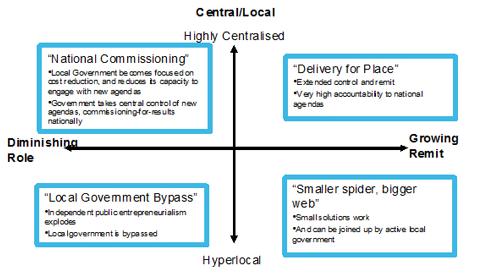Chris Game
Labour published its draft 2015 local government manifesto recently. Entitled Labour and localism: perspectives on a new English deal, the core of the deal is a radical new approach to the financing of local government:
“ … too much power is hoarded in Whitehall. That’s why we need a fundamental shift from the centre to the local – communities, towns, cities and counties – which gives more power to people and to the elected politicians we already have.” (p.4)
Sounds good, doesn’t it, but also perhaps faintly familiar? Compare and contrast, as they say, with this:
“Over the last forty years, governments of all colours have been guilty of weakening local government. Bureaucratic control has replaced democratic accountability. Hoarding of power by distant politicians and unaccountable officials in Whitehall has damaged society by eroding trust.
“We believe if you decentralise power, you get better results and better value for money. So the plans in this manifesto represent an unprecedented redistribution of power and control from the central to the local, from politicians and the bureaucracy to individuals, families and neighbourhoods.”
The comparison, I think you’ll agree, shows that they’re pretty similar – lots of Whitehall hoarding being supplanted by earth-moving shifts of power to localities. The contrast is that the second quote comes from the Conservatives’ manifesto in 2010 – p.73, to be precise.
Which means, of course, that the ‘unprecedented redistribution’ must already be well underway. Evidence on the ground, however, suggests otherwise. I doubt, for instance, if Somerset Levels residents, whose ground is currently flooded, reckon they’ve seen much redistribution – of power, that is, not water. They’ve discovered the hard way that, even if their elected local drainage boards manage to persuade the unelected Environment Agency that dredging and other flood defence work is necessary, what actually happens is determined by the Agency’s funding from the Department for Environment, and ultimately by benefit-to-cost rules imposed by the Treasury.
That’s how things work, in our most hypercentralised of governmental systems. As Yes, Minister taught us back in the 1980s and, as that Conservative manifesto acknowledged, Whitehall bureaucracy trumps local democracy every time.
Regarding local government, it’s hard to know whether the politicians who signed up to that 2010 decentralisation pledge, or the Ministers subsequently responsible for implementing it, ever really believed in it – other than as a vote-winning slogan. Communities and Local Government Secretary, Eric Pickles, self-admittedly didn’t. His brand of what he calls ‘muscular localism’ involves effectively setting councils’ tax and spending levels and telling them how often they should empty our refuse bins.
Cities Minister, Greg Clark, at least tries to walk the localisation walk, with his City Deals policy of stimulating city-driven economic growth through negotiated packages of powers and discretions. However, doubling until recently as Financial Secretary to the Treasury, few knew better than Clark where the serious power in Britain resides, irrespective of the party in government. It’s in Whitehall departments and ultimately in the quaintly addressed Unit 1, Horse Guards Road, aka Her Majesty’s Treasury – between them a far more formidable obstacle to a genuine English devolution deal than any temporary bunch of Ministers.
Were any confirmation needed, it’s come in spades recently, in the Institute for Government’s fascinating study, Achieving Political Decentralisation, of how and why opposition parties so good at making commitments to devolve power have as governments found it so hard to implement them. Tom Gash and his IfG colleagues identify from their case studies a pleasingly neat, if depressing, ten obstacles to reform that anyone seeking to decentralise power must navigate.
At Number 1 – where else could it be? – is Resistance from national government, the essence of which is “the fact that ministers and civil servants simply do not trust sub-national government to competently exercise additional powers and … constantly worry that they will “do something barmy” (p.20). It almost beggars belief, doesn’t it? The civil service folks who brought us the NHS IT programme, the Child Support Agency, the West coast rail franchising fiasco, non-flying Chinook helicopters, and mothballed aircraft carriers sit around worrying about other people’s sanity and competence!
Unfortunately, there’s a serious point here, although – certainly on this platform – I’m inclined to put it less genteely than the IfG. Whitehall departments’ resistance to devolution doesn’t stem just from it being their powers and budgets that parties, when in opposition, want to devolve. Much worse, the beneficiaries would be a collection of local councils and politicians that senior civil servants generally regard in much the way that Mr Banks, prior to being saved by Mary Poppins, viewed his children: with an unconcealed mixture of disdain and distrust.
For the alliteratively inclined, it amounts to a culture of centralist contempt, and is naturally seen most obviously in the big things: local government’s huge dependence on central funding, the centre’s stranglehold on councils’ housebuilding, planning, and indeed their total budgets. If you actually work in local government, though, it’s possibly the smaller things – the almost daily drip, drip of petty insult, distrust, denigration and condescension – that really get you down. Let me illustrate with a couple of examples from last week’s drips – one trivial but irritating, one non-trivial and infuriating.
First, we have a typical illustration of how our Communities Secretary, when aggrieved, resorts to the role of Victorian paterfamilias and takes it out on his local authority children. Thwarted by Cabinet colleagues from reducing the council tax referendum trigger from an increase of 2% to 1.5 or even 1%, Pickles immediately put before Parliament alternative proposals he claimed would protect ‘hard-working families’ from their greedy councils: requiring them to publish, as a matter of record, each councillor’s individual vote on any council tax changes.
The Minister had discovered that most councils’ budget votes last year, whether to freeze or increase their council tax, were by a show of hands, with just the totals or results recorded in the Minutes. He disingenuously implies that this represents something underhand, although, as a onetime council leader, he knows full well that this is how most council votes are taken – a ‘named vote’ being taken only if called for by a specified number of councillors.
Taking Labour-controlled Birmingham as an example, there were in fact three named votes at last February’s Council budget meeting, on amendments proposed by the minority Conservative and Lib Dem parties. Named votes were called for, and the amendments were comfortably defeated by Labour’s 71 councillors voting en bloc – precisely as they would have done in support of the main motions to approve the Council’s Business Plan, Budget and Council Tax Requirement.
And that’s the point. In most council votes, as in Parliament, councillors vote with their party, and when one party has a clear overall majority, a named vote serves little purpose and wastes time. If Pickles wants to argue that the annual setting of the level of council tax is uniquely important, that’s fine. But to pretend that recorded votes will enhance local accountability and keep tax rates down is a deception of his hard-working families, as well as confirmation that he feels it entirely appropriate for a Cabinet Minister to dictate in detail how elected local governments conduct their business.
My second case is an archetypal central government gaffe – an example of what happens when you legislate from the centre without adequate consultation or scrutiny. This time it was the Bedroom Tax (or Spare Room Subsidy) – last April’s controversial change by the Department for Work and Pensions (DWP) that cut the housing benefit of those living in a council or housing association property deemed to have one or more spare bedrooms. The legislation should have exempted working-age tenants who had been living at the same address and entitled to claim housing benefit continuously since 1 January 1996. Basic as it seems, it didn’t – meaning that estimated tens of thousands of tenants are entitled to refunds of around £640 for 40 weeks of undue reductions.
To ordinary citizens, expecting perhaps at least a hint of humility, the DWP’s response to councils might seem extraordinary, and even for those of us only too familiar with the ways of central government, it was a minor classic. First, they disputed all local government and housing professionals’ estimates of the numbers. Their methodology calculated that “very few” households – maybe 5,000 – were affected.
Second, no, they wouldn’t disclose their methodology, even to the Local Government Association. Third, while the DWP would of course close the loophole, councils could pay for the department’s unfortunate slip-up by footing the bill for identifying, locating and refunding the relevant claimants. And you thought maybe I was exaggerating, talking of a centralist culture of contempt?
Chris Game is a Visiting Lecturer at INLOGOV interested in the politics of local government; local elections, electoral reform and other electoral behaviour; party politics; political leadership and management; member-officer relations; central-local relations; use of consumer and opinion research in local government; the modernisation agenda and the implementation of executive local government.


